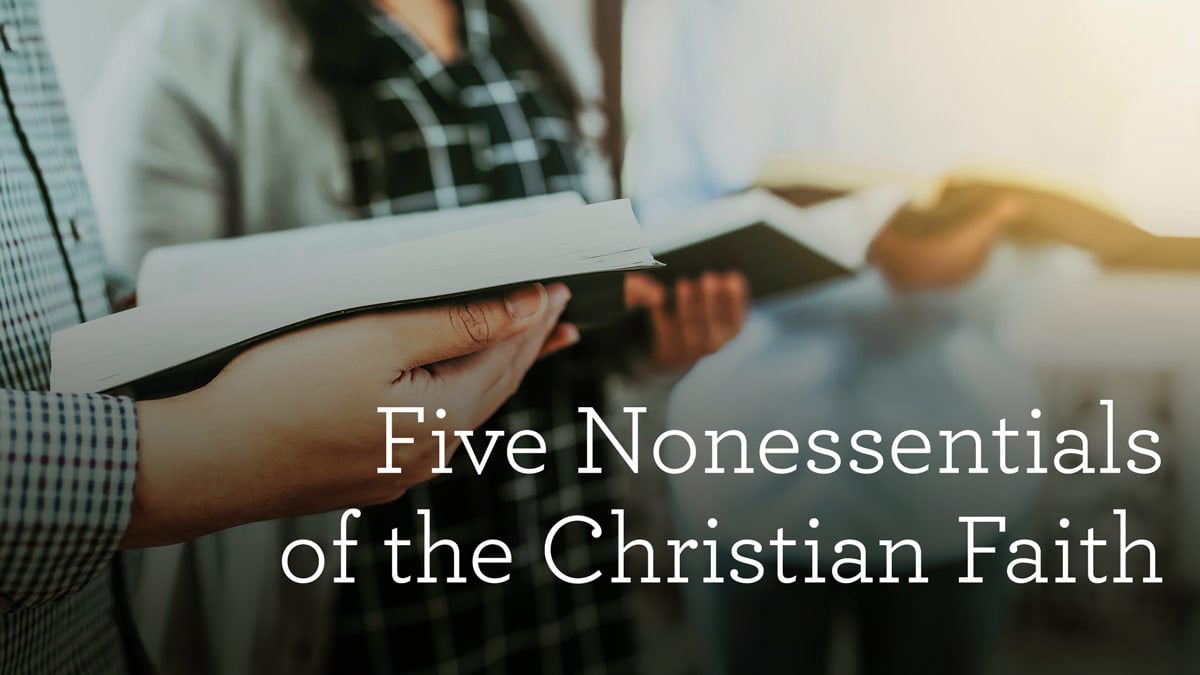
For churches that take the Bible seriously, doctrine can be dangerous. Where theology is appreciated and taught, the hazard is not vagueness, compromise, or fellowship based on the lowest common denominator; it’s just the opposite. When people begin to take doctrine seriously (which we all ought to), they may also become rigid and demand too much of others—and sometimes even of themselves. In other words, we risk making essential what is actually nonessential.
Doctrine Matters
We must state plainly up front that even though doctrinal rigidness is a danger, doctrinal indifference is a mistake. Paul says clearly to Titus that an elder in Christ’s church “must hold firm to the trustworthy word as taught, so that he may be able to give instruction in sound doctrine and also to rebuke those who contradict it” (Titus 1:9). Healthy, biblical doctrine ought to permeate a local church and its leaders. Likewise, Paul instructs Timothy that the doctrine taught in churches must “agree with the sound words of our Lord Jesus Christ and the teaching that accords with godliness” (1 Tim. 6:3). Indeed, doctrine matters!
The church does not possess an authority of itself; rather, the church is under the authority of Scripture, and we ought only to go as far as the Bible in determining what is essential to the Gospel.
At the same time, it is essential to affirm that Scripture is the only full, final, and sole authority. The church does not possess an authority of itself; rather, the church is under the authority of Scripture, and we ought only to go as far as the Bible in determining what is essential to the Gospel. Even a theologian as doctrinally rigorous as John Calvin believed in charity over nonessentials. Commenting on Philippians 3:15, he says,
Does this not sufficiently indicate that a difference of opinion over these nonessential matters should in no wise be the basis of schism among Christians? First and foremost, we should agree on all points. But since all men are somewhat beclouded with ignorance, either we must leave no church remaining, or we must condone delusion in those matters which can go unknown without harm to the sum of religion and without loss of salvation.1
We may all be right about some things, but none of us is right about everything. Nonessentials, then, should not be cause for division.
Five Nonessentials of the Faith
When we say that something is a nonessential, we’re not saying that it is irrelevant or unimportant. What we are affirming is that certain things, or a particular perspective on certain things, are not necessary to salvation. A list of such matters could be endless, but let us consider five nonessentials (drawn from Martyn Lloyd-Jones’s What Is an Evangelical?) that come up regularly in some of our church contexts.
1. Election and Predestination
The utter sovereignty of God over the salvation of His people is a precious truth that, when understood properly, cuts down our pride and in turn causes us to be more gracious to others. Nevertheless, the doctrines of grace can stir up contention with respect to both how we talk about them and how others receive them.
It is not my knowledge of the great and mysterious electing purposes of God that is the ground of my salvation, but it is the very grace of God at work in my life—whether I am able to articulate it or not.
The fundamental issue for us is that we are not saved on account of our understanding of saving grace; rather, God saves us by His grace. It is not my knowledge of the great and mysterious electing purposes of God that is the ground of my salvation, but it is the very grace of God at work in my life—whether I am able to articulate it or not.
2. Baptism
The mode of and age for baptism must also be regarded as a nonessential. The ordinance of baptism itself is essential within the life of every local church, but the particular way in which it is practiced is not nearly as important as that it is practiced.
Every pastor and every church must retain firm convictions as to how and when it will administer this sacrament that Christ Himself ordained. And yet one’s convictions on baptism are not sufficient cause to disavow fellowship with those with whom we disagree.
3. Church Polity
The structure of leadership in a church is another nonessential. People hold strong views on governance, but it cannot be the basis for fellowship or for distinguishing ourselves from fellowship.
A church absolutely must have Christlike, capable leaders to succeed. But how those leaders and their congregation choose to structure their polity is not essential to having a thriving Gospel ministry.
4. Eschatology
The question of when Jesus is coming back—particularly whether He’s coming before the millennium or after the millennium or in the middle of the millennium—must also be regarded as a nonessential. We can’t even agree if it’s a literal millennium!
Some choose to grasp their eschatology very tightly, and practically, they make their position a mark of Christian orthodoxy—a fundamental of the faith. We may have historic reasons for hanging on to one position on the end times while distancing ourselves from another. But what is essential here is that when Jesus says, “Surely I am coming soon,” we say in response, “Amen. Come, Lord Jesus!” (Rev. 22:20).
5. Spiritual Gifts
The use and application of spiritual gifts today is a subject that evangelical Christians often put at the center of their church life, making it a touchstone of orthodoxy. Surely, abuses of the gifts exist, and we should call out evident malpractice as we see it.
Provided our unity is in the Gospel of the Lord Jesus Christ, we need not feel that we have to press people to our own conclusions.
Still, the mere possibility of recklessness or neglect on either side does not require that we separate ourselves from those who hold a different position than we on the spiritual gifts. Provided our unity is in the Gospel of the Lord Jesus Christ, we need not feel that we have to press people to our own conclusions.
The Main Things
On nonessential matters, we should agree to disagree without being disagreeable, making sure that none of these issues robs us of the genuine joy that is ours in the Gospel. Those things that are foundational to what it means to be a Gospel church bring us into fellowship with people from all places and backgrounds. We should expect and even celebrate that glorious reality.
For healthy Christians and churches, the main things are the plain things, and the plain things are the main things. Genuine brothers and sisters in Christ may operate very differently from us and hold different views from us on a host of nonessentials. Yet this is a cause not for disunity but for rejoicing in the diversity of Christ’s body, the true members of which are united forever in the Gospel of our Lord Jesus.
This article is adapted from the sermon “The Danger of the Nonessentials” by Alistair Begg.
1 John Calvin, Institutes of the Christian Religion, ed. John T. McNeill, trans. Ford Lewis Battles (Philadelphia: Westminster, 1960), 4.1.12.
Topics: Articles
